Introduction
Navigating the complexities of autism spectrum disorder (ASD) can be a challenging journey for parents seeking to understand their child's unique needs. Online autism tests have emerged as innovative tools designed to assist in this process, offering preliminary insights through a series of questions that assess behavioral and developmental traits linked to autism. While these digital assessments are not replacements for professional diagnoses, they play a crucial role in raising awareness and prompting further evaluation.
Developed with extensive user testing and community input, tools like the AutSPACEs project highlight the importance of making mental health resources accessible and tailored to the individual needs of those on the autism spectrum. This article explores the advantages and limitations of online autism tests, emphasizing the significance of professional evaluations and a balanced approach to ensure the well-being of every child.
What Are Online Autism Tests?
'Online assessments for developmental disorders are innovative digital tools created to assist individuals in evaluating the likelihood of this condition in themselves or their children.'. These assessments typically consist of a set of inquiries designed to uncover behavioral and developmental characteristics associated with the condition. Though not a substitute for a professional diagnosis, they offer valuable preliminary insights and highlight areas that may require further examination.
Such tools play an essential role in raising awareness and providing early indications that can prompt parents to seek professional advice. The development of these assessments often involves extensive user testing and community input to ensure they are both effective and user-friendly. For instance, the AutSPACEs project, which focuses on making environments more accessible for autistic individuals, exemplifies this approach. This project has been co-designed by autistic people from the outset, through scoping sessions, focus groups, and community meetings, ensuring that the tools developed are relevant and beneficial to the community.
These digital assessments are part of a broader movement towards integrating technology in mental health care, emphasizing the importance of empathy and understanding in therapeutic settings. They demonstrate an increasing acknowledgment of the necessity to enhance mental health resources, making them more available and suited to the specific requirements of individuals on the spectrum.
Pros of Online Autism Tests
Online evaluations for developmental disorders provide unmatched convenience, enabling parents to assess their child's behavior from the ease of their own residence. This convenience eliminates the stress associated with clinical settings and can expedite the process of identifying potential issues. 'With many assessments being free or low-cost, families can access these resources without financial strain.'. Additionally, these tools facilitate early detection, enabling parents to seek professional evaluations sooner. As emphasized by the Oxford Health NHS Trust's initiative, the creation of digital diagnostic tools is further improving accessibility and assistance for families going through assessments related to developmental disorders.
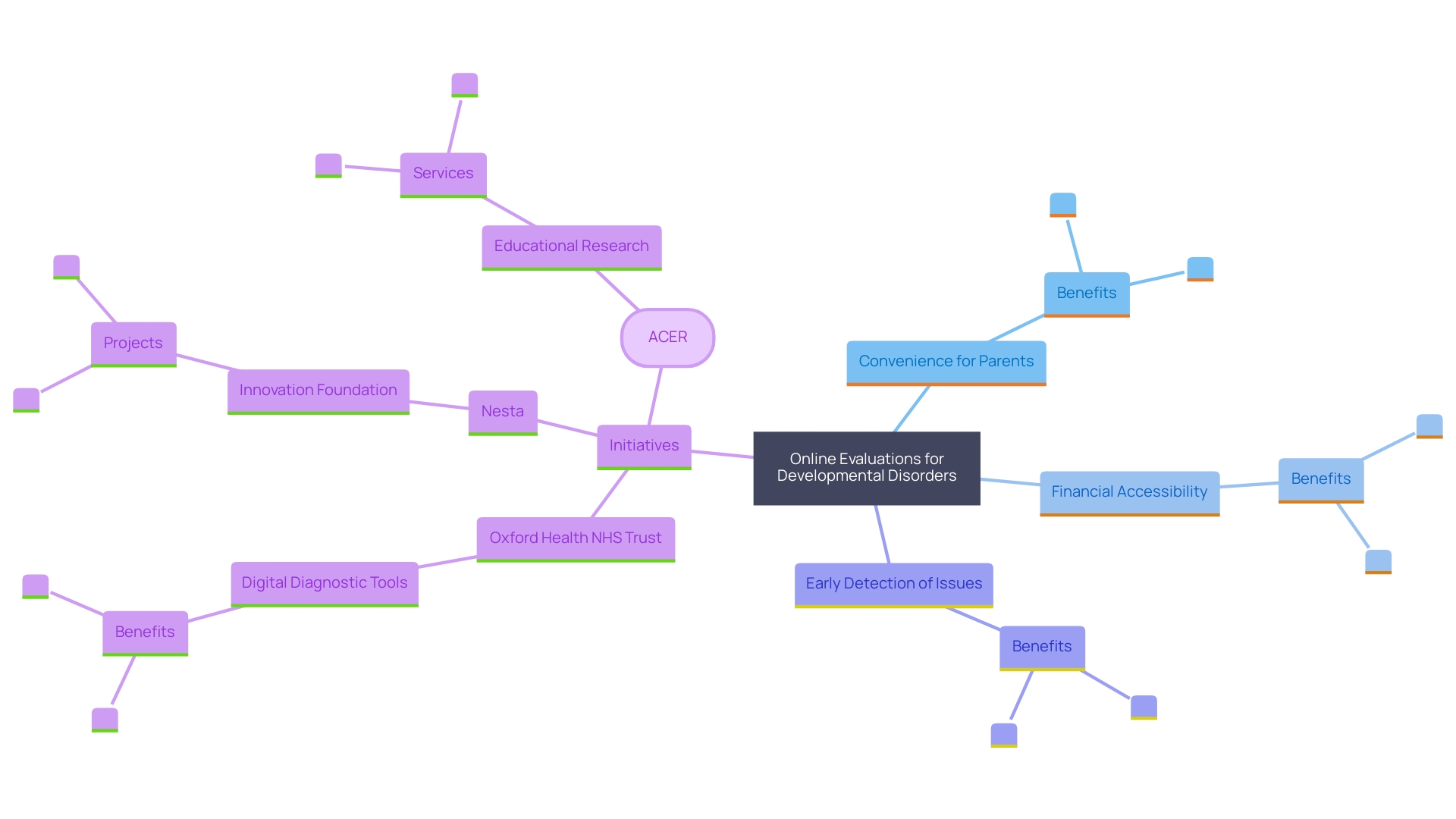
Cons of Online Autism Tests
Although virtual evaluations for developmental disorders provide certain advantages, they also present significant drawbacks. These evaluations often lack the depth of professional assessments, missing out on important environmental factors and the full range of behaviors. The results can sometimes be misleading, causing unnecessary anxiety or false reassurance. Lindsay Oberman, director of the Neurostimulation Research Program at the National Institute of Mental Health, points out that findings from less rigorous studies, like retrospective chart reviews without control groups, can be influenced by various factors, including placebo effects. Consequently, it is essential to approach internet assessments related to developmental conditions with care and keep in mind that they do not replace expert evaluations.
Accuracy and Reliability of Online Autism Tests
The effectiveness of online autism assessments can vary widely, influenced by the design and the specific questions posed. Some of these assessments are based on established screening instruments, while others lack rigorous scientific validation. It's crucial to recognize that, while these assessments can offer valuable insights, they are not definitive diagnoses. As Dr. David (Dan) R. Offord, a renowned psychiatrist specializing in young people, emphasized, ensuring that children, including those with disabilities, participate meaningfully and receive appropriate support is fundamental to their mental health and well-being. This principle emphasizes the significance of considering internet-based assessments for developmental conditions as an initial measure instead of a definitive conclusion. Parents should use these insights as a starting point for further evaluation and intervention, ensuring that their children receive the necessary resources and support to thrive.
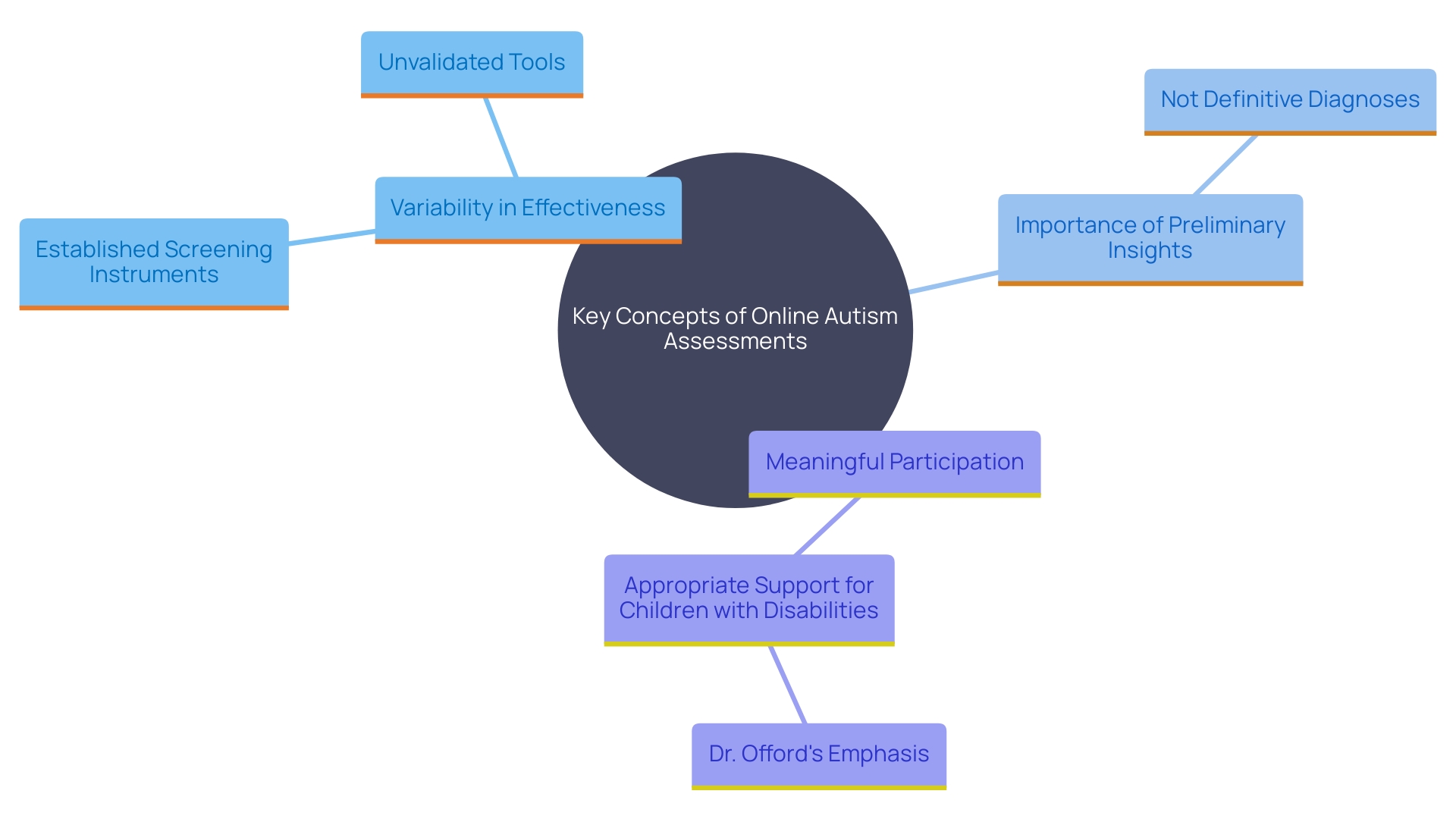
Factors Affecting the Accuracy of Online Autism Tests
The accuracy of online evaluations related to developmental disorders can be influenced by various factors. The respondent's understanding of questions and honesty in their responses are critical. The behaviors being assessed also play a vital role. Cultural differences and unique developmental milestones can further impact how behaviors are interpreted. According to the Diagnostic and Statistical Manual of Mental Disorders, Fifth Edition (DSM-5), disorders on the spectrum involve significant challenges in social communication and repetitive behaviors that affect daily functioning. Indicators of the condition are noticeable from early childhood and continue throughout life. Timely assistance can greatly enhance results, with studies indicating that 76.5% of youngsters with developmental disorders who receive early help can integrate into mainstream educational programs. Considering these complexities, parents should thoughtfully assess these elements when evaluating assessment outcomes to guarantee a thorough comprehension of their offspring's requirements.
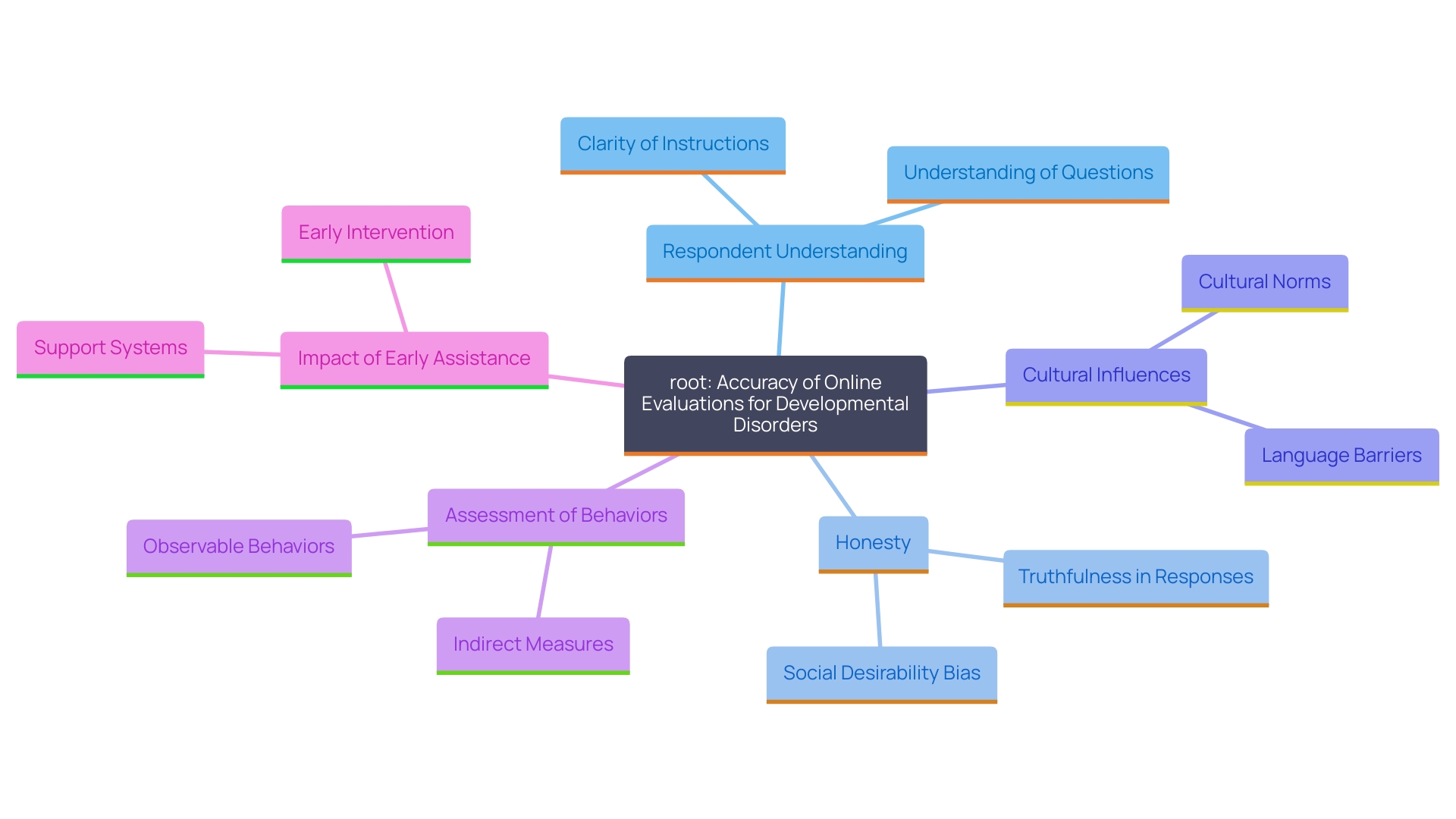
The Importance of Professional Evaluation
'While online autism assessments can provide an initial indication, a thorough evaluation by a qualified professional is essential for an accurate diagnosis.'. Professional assessments encompass detailed interviews, observational evaluations, and standardized tests, offering a comprehensive view of a young person's development. This approach ensures that children receive tailored recommendations and support, paving the way for effective interventions. According to the National Institute of Mental Health, medical research follows a hierarchy of evidence, with controlled trials often providing the most reliable data. Engaging with a specialist guarantees that families are guided by the most accurate and up-to-date information available.
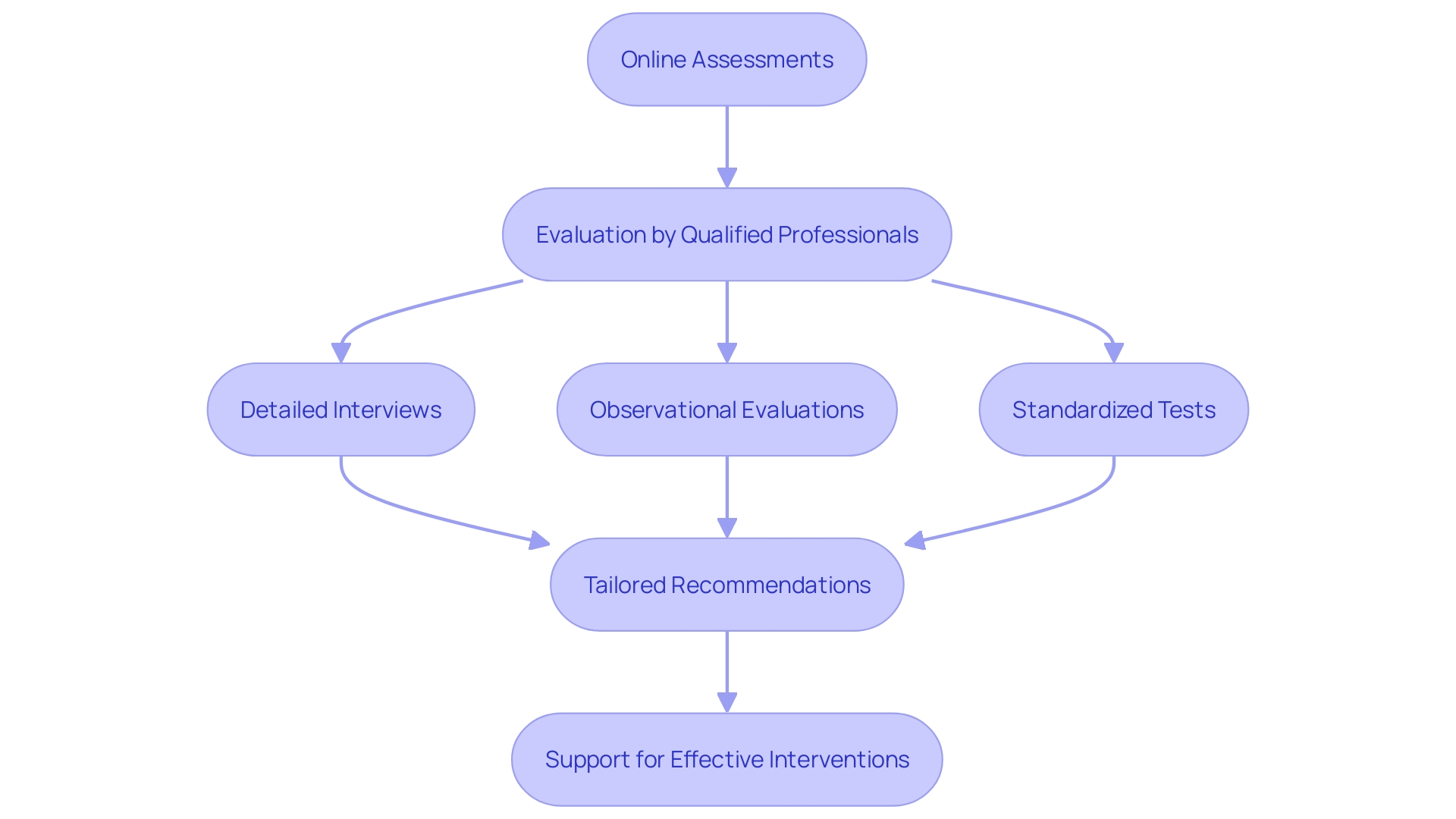
Balancing Online and In-Person Assessments
A mix of digital and in-person evaluations can provide a thorough method for parents. Online quizzes serve as an initial step, identifying potential signs of autism and providing a baseline understanding. However, to gain a thorough insight, it's essential to follow up with a professional evaluation. This method aligns with the collaborative care model proposed by Professors Talbott and De Los Reyes, which emphasizes teamwork between healthcare and education leaders and the use of data from various sources, including parents, teachers, and youth. By combining both virtual and professional evaluations, parents can guarantee a comprehensive strategy for their offspring's development, facilitating better-supported involvement in school, home, and community activities. As Dr. David Offord highlighted, it's about making the race fair for all children by recognizing their needs and assets while reducing stress and providing necessary resources for caregivers.
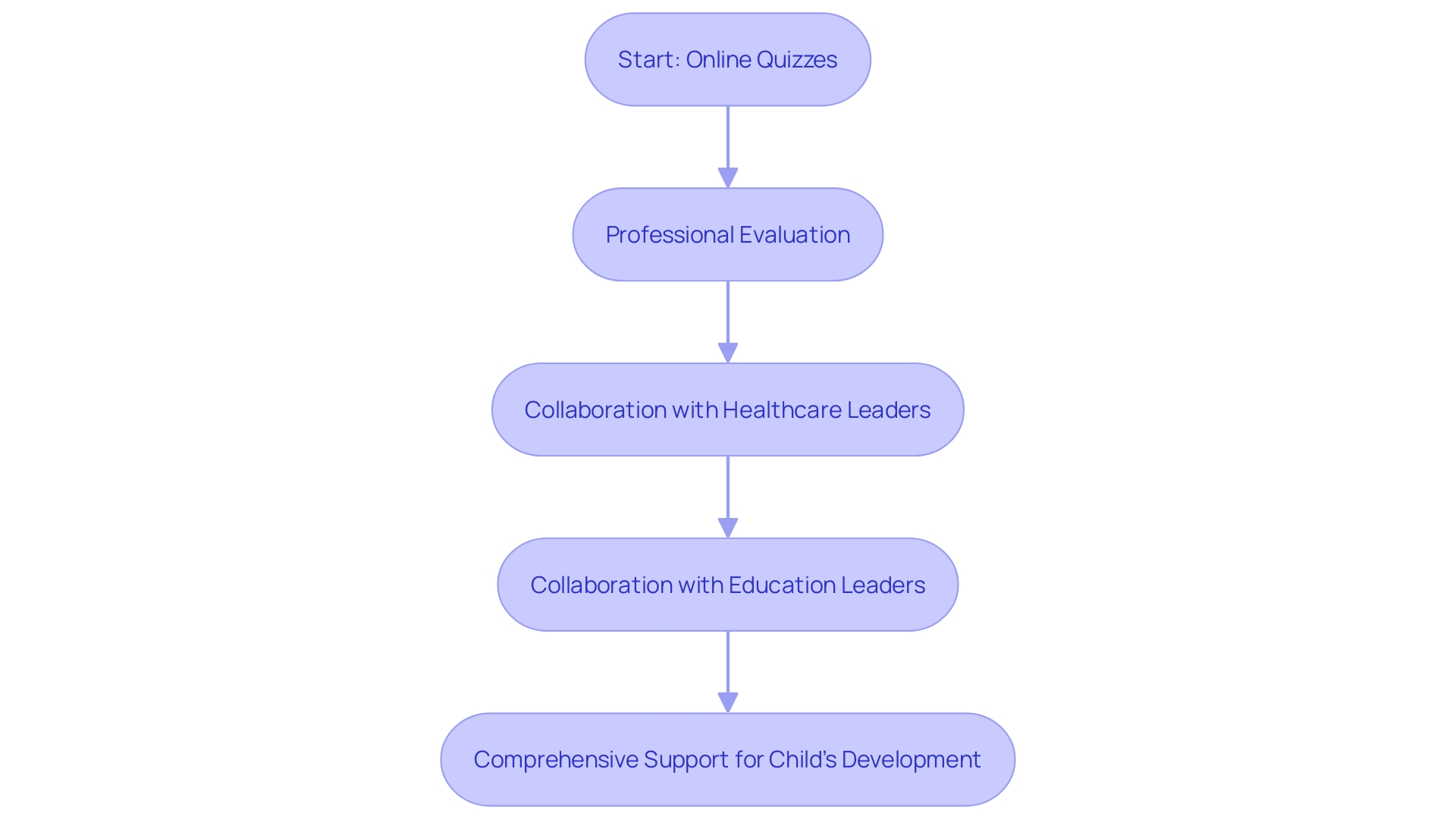
Limitations and Potential Biases of Online Autism Tests
When considering online quizzes related to developmental disorders, it's crucial to understand that their design may unintentionally introduce biases, affecting both the accuracy and interpretation of results. Some of these assessments may emphasize certain behaviors over others or overlook the varied manifestations of autism. This variability can lead to skewed outcomes, making it essential for parents to critically evaluate the results. For instance, methodological approaches like item response theory and measurement invariance are pivotal in ensuring the reliability and validity of such assessments. However, not all digital quizzes employ these rigorous standards. A retrospective chart review highlighted that without control groups, results might be influenced by external factors, stressing the need for professional guidance when interpreting these tests. As Kris Perry, executive director of the Children and Screens Institute, underscores, understanding the unique needs of neurodiverse youth is paramount. Therefore, while online tools can offer initial insights, they should never replace comprehensive evaluations conducted by qualified professionals.
Conclusion
Navigating the landscape of autism spectrum disorder (ASD) assessments can be complex, yet online autism tests serve as valuable tools in this journey. These digital assessments provide preliminary insights into behavioral and developmental traits, empowering parents to take the first step toward understanding their child's unique needs. While they are not substitutes for professional evaluations, they play a critical role in raising awareness and encouraging further exploration of potential concerns.
However, it is essential to approach online tests with a discerning eye. Their limitations, including the potential for misleading results and the lack of depth compared to professional assessments, highlight the importance of not relying solely on these tools for diagnosis. Factors such as the respondent's understanding and cultural context can significantly influence outcomes, making it vital for parents to interpret results cautiously and as part of a broader assessment strategy.
Ultimately, a balanced approach that combines online assessments with thorough professional evaluations ensures that children receive the tailored support they need. Engaging with qualified specialists guarantees that families are guided by the most accurate and up-to-date information, paving the way for effective interventions. By integrating both online and in-person assessments, parents can provide their children with the resources necessary to thrive in all aspects of life, promoting their well-being and fostering their unique strengths.




